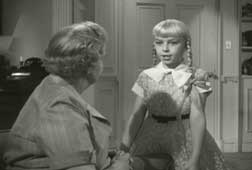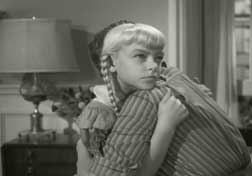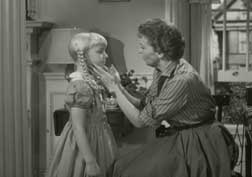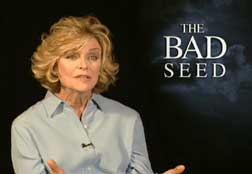 THE
BAD SEED (1956)
THE
BAD SEED (1956)Director: Mervyn LeRoy
Warner Home Video
 THE
BAD SEED (1956)
THE
BAD SEED (1956)The
character of nasty but cunning child Rhoda Penmark was the innovation of writer
William Archibald, who attempted to illustrate a theory of whether or not evil
and mental illness were hereditary, in this case, stemming from the young girl's
serial killer grandmother. Playwright Maxwell Anderson turned the novel into a
hit play that won Nancy Kelly a Tony Award for portraying Rhoda's mother and spearheaded
the career of child actress Patty McCormack. In 1956, Warner Bros. brought the
play to the big screen, shortly after its stage run, and wisely chose to keep
on six of the original cast members.
Christine Penmark (Nancy Kelly) realizes that her young daughter Rhoda (Patty McCormack) is responsible for the death of Claude Daigle, a boy at school who won the penmanship medal which Rhoda wanted really badly. Rhoda is seemingly also responsible for the accidental death of an elderly lady, and Christine's suspicions are confirmed when she discovers the medal in Rhoda's possession, with pigtailed menace trying to destroy some murder evidence. The weird, child-like handyman Le Roy (the late, great Henry Jones) knows too much and after taunting Rhoda with accusations about the murder, he is set on fire. Christine now is certain that since she was born of a convicted murderess, she's actually responsible for passing on a hereditary "bad seed" to her daughter, and proceeds with a drastic measure due to this.
 Very
much filmed as a stage play with limited sets and some very overbearing acting,
THE BAD SEED still translated well onto the big screen. You can call this campy
or dated, but it really still packs a punch and the storyline of this outwardly
sweet and perfect little girl capable of psychotic killings and putting up a front
to hide her actions, gives it an underlying, uneasy creepiness. Rhoda is captivatingly
played by McCormack (Oscar-nominated here), and the film set a precedent for all
the "demon kids" in cinema for years to follow. Kelly gives a typical
bygone-era Broadway performance, but one filled with emotion and a kind of desperation
that allows the audience to sympathize with her. Also in the cast are 50s sci-fi
star William Hopper as the loving husband away in Washington for most of the film;
Evelyn Varden as the friendly, aunt-like apartment owner; Paul Fix as Christine's
criminology writing father, who can't believe his sweet granddaughter can be sadistic;
and a scene-stealing Eileen Heckart as the distraught, alcoholic mother of the
dead boy. The "curtain call" ending was tacked on at the censor's request,
and
Very
much filmed as a stage play with limited sets and some very overbearing acting,
THE BAD SEED still translated well onto the big screen. You can call this campy
or dated, but it really still packs a punch and the storyline of this outwardly
sweet and perfect little girl capable of psychotic killings and putting up a front
to hide her actions, gives it an underlying, uneasy creepiness. Rhoda is captivatingly
played by McCormack (Oscar-nominated here), and the film set a precedent for all
the "demon kids" in cinema for years to follow. Kelly gives a typical
bygone-era Broadway performance, but one filled with emotion and a kind of desperation
that allows the audience to sympathize with her. Also in the cast are 50s sci-fi
star William Hopper as the loving husband away in Washington for most of the film;
Evelyn Varden as the friendly, aunt-like apartment owner; Paul Fix as Christine's
criminology writing father, who can't believe his sweet granddaughter can be sadistic;
and a scene-stealing Eileen Heckart as the distraught, alcoholic mother of the
dead boy. The "curtain call" ending was tacked on at the censor's request,
and  adds
relief to a rather downbeat finale.
adds
relief to a rather downbeat finale.
Warner
Home Video has presented THE BAD SEED in a full frame transfer that's looks very
impressive. The black and white image is crisp, clean and finely detailed. The
blacks appear deep and the whites are very stable in appearance. You'll see a
few nicks and scratches, but they are very minor in this excellent video presentation.
The Dolby Digital mono track is also impressive, especially for a film of this
vintage, with dialog being very clear and Alex North's robust score remaining
 distinct.
There are also optional English, French and Spanish subtitles.
distinct.
There are also optional English, French and Spanish subtitles.
As for the supplements, "Enfant Terrible" is a 15-minute video interview with McCormack where she discusses everything from the play's beginning, to it being brought to film, and a bit about her co-stars. This and a lot more is also touched upon in a fun commentary with McCormack moderated by Charles Busch. The actress has a vivid recollection of working on the film all those years ago and at such an early age, and Busch throws a lot of good questions her way. She also points out how certain parts in the film where different on stage (or not in the play altogether), talks about her relationship with the other actors, as well as the before and after of her career in relation to THE BAD SEED. Even when they are just watching the film and commenting on it, it's still a pleasure to listen to. The original theatrical trailer is also included. (George R. Reis)